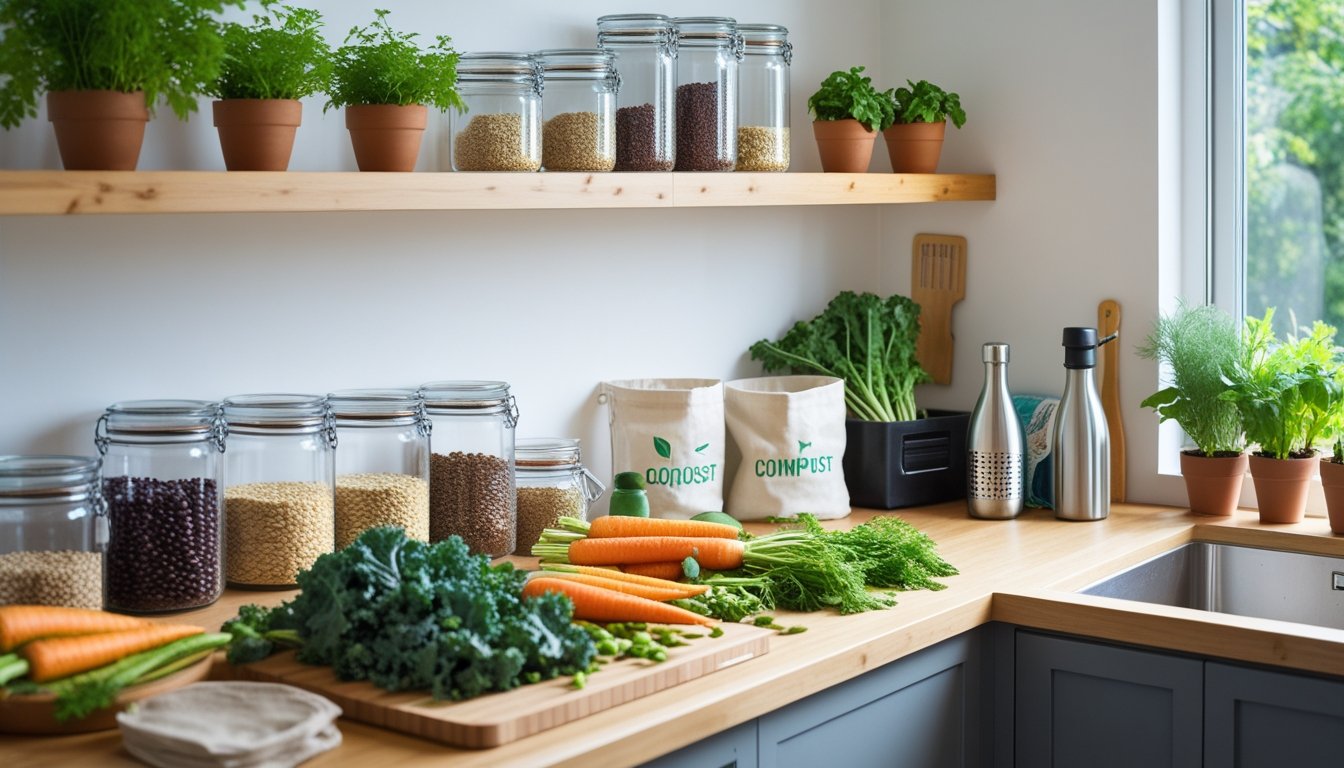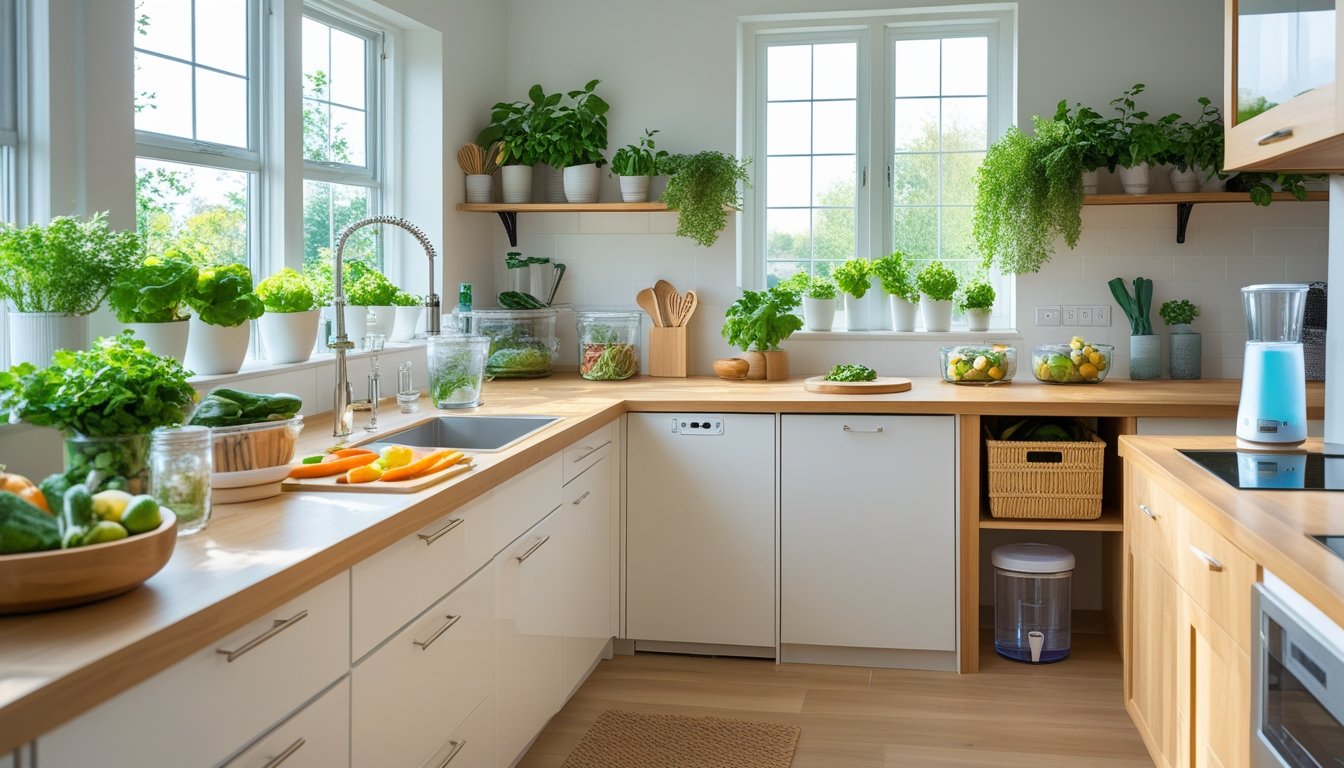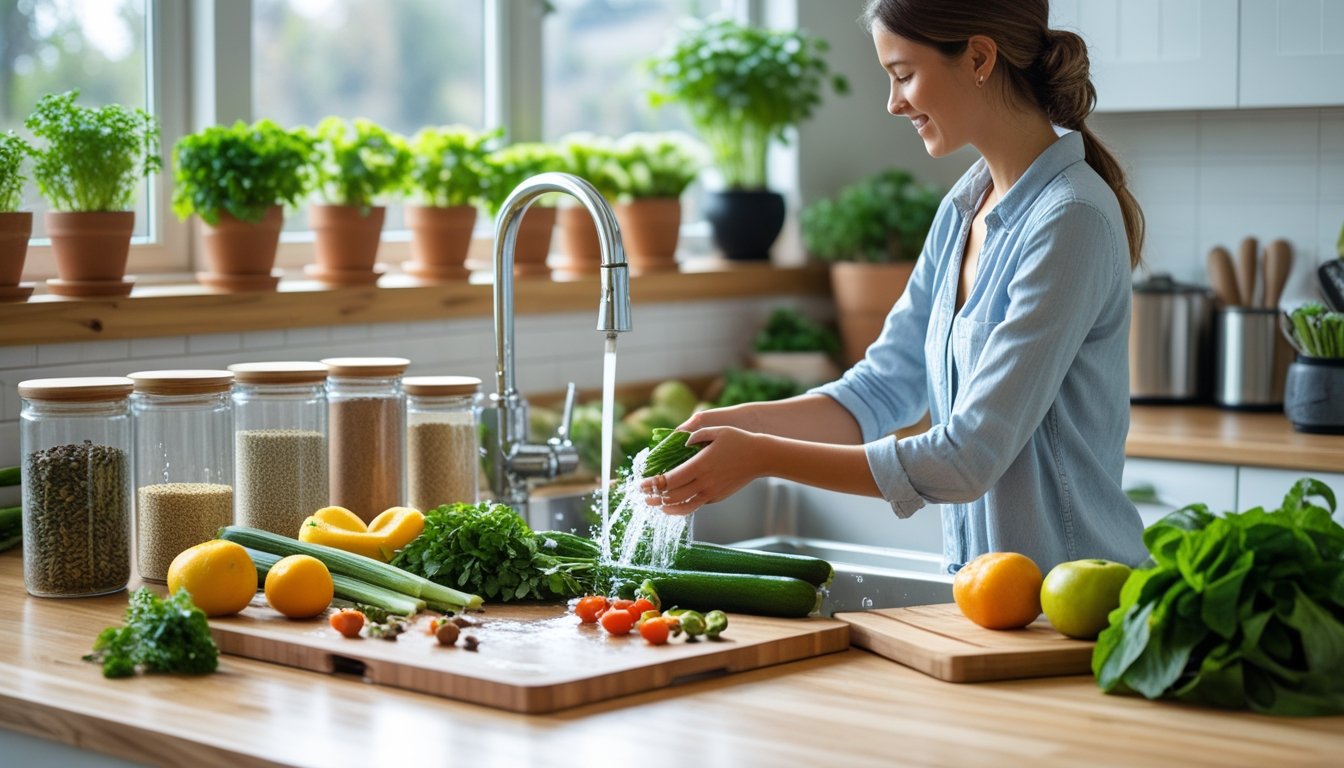Late updated: 21 Sep 2025 12:09
Written by: Sarah Hollister
Eco-Friendly Kitchen Hacks For A Sustainable Lifestyle: Simple Tips For Green Living
In our kitchens, the journey towards an eco-friendly lifestyle begins with small, meaningful changes that collectively contribute to sustainability. By embracing simple swaps and adopting eco-conscious habits, we can transform our kitchens into spaces that minimise waste and conserve resources. Using environmentally-friendly practices in our kitchens not only benefits the planet but also enhances the efficiency and cost-effectiveness of our culinary routines.

The heart of our homes often generates significant waste and energy consumption, making it a prime area to target for sustainability efforts. By choosing reusable alternatives and incorporating energy-efficient appliances, we can dramatically lower our environmental impact. These actions not only support our sustainability goals but also align with our values of living thoughtfully and responsibly.
Our commitment to adopting greener kitchen habits can lead to a more harmonious existence with the environment. We encourage readers to engage with these practices, as they lead to a reduction in our ecological footprint while also saving money and creating a healthier living space. The journey to a sustainable lifestyle is ongoing, and our kitchens are an ideal place to start.
Key Takeaways
- Simple eco-friendly swaps make a big impact on sustainability.
- Reducing kitchen waste leads to financial savings.
- Energy-efficient kitchens contribute to a healthier environment.
Essential Eco-Friendly Kitchen Hacks for Sustainable Living
Creating a sustainable kitchen requires focusing on reducing waste and choosing eco-friendly alternatives. By integrating eco-conscious habits and sustainable products, we can significantly lessen the environmental impact of our daily cooking and food storage routines. From minimising single-use plastics to adopting thoughtful meal preparation techniques, these strategies are both practical and impactful.
Reducing Single-Use Plastics and Plastic Waste
Eliminating single-use plastics is a pivotal step in fostering a more sustainable kitchen. One effective approach is to replace plastic wraps with beeswax wraps. These wraps are reusable and biodegradable, offering an eco-friendly alternative for covering food. Additionally, switching to silicone baking mats instead of disposable parchment paper can drastically reduce waste in the baking process.
We can incorporate reusable produce bags and grocery bags during our shopping trips. These options not only cut down on plastic usage but also help in significantly reducing our plastic footprint. When storing leftovers, opting for durable glass storage containers over traditional plastic options ensures we are making sustainable choices that last longer and are healthier for food storage.
Sustainable Food Storage Solutions
Proper food storage is crucial for reducing waste and preserving freshness. Using glass containers, which are durable and free from harmful chemicals found in plastics, is a great start. They offer a clear advantage over plastic in terms of both health and longevity. Additionally, beeswax wraps can be used as a sustainable substitute for cling film, keeping fruits and vegetables fresh without contributing to plastic wastage.
Silicone food bags present another eco-conscious alternative, providing a versatile and reusable option for storing snacks and leftovers. Moreover, investing in a high-quality food vacuum sealer helps extend the shelf life of perishable items, effectively reducing food waste and maintaining taste and texture.
Conscious Cooking and Meal Preparation
Thoughtful meal preparation can greatly diminish a kitchen's environmental impact. We can begin by planning meals in advance, thereby reducing the likelihood of unnecessary food purchases and waste. Cooking larger portions and freezing leftovers also saves both time and resources.
Using energy-efficient appliances, such as induction cooktops and LED lighting, can significantly lower energy consumption during meal preparation. Additionally, opting for seasonal and locally-sourced ingredients reduces the carbon footprint associated with food transportation. Employing these practices enables us to enjoy our meals while being mindful of our ecological responsibilities.
Reducing Food Waste in the Kitchen
Reducing food waste is a cornerstone of maintaining a sustainable kitchen. One effective method is to start a compost pile which transforms food scraps into nutrient-rich compost for gardening. This practice not only reduces waste but also enriches the soil for growing our own produce.
We can also transform uneaten leftovers into new dishes, creatively repurposing last night’s dinner into today’s lunch. Furthermore, good habits such as checking our pantry before shopping help in preventing the purchase of unnecessary items, thus keeping food waste to a minimum. Adopting these practices allows us to make positive changes that benefit both our household and the planet.
Advanced Sustainable Practices for an Eco-Friendly Kitchen

In our pursuit of sustainability, we've embraced innovative practices that not only conserve resources but also offer practical benefits. Emphasising energy-efficient appliances, non-toxic cleaning solutions, and effective waste management, we transform kitchen routines into more environmentally responsible actions.
Energy-Efficient Appliances and Cooking Techniques
Switching to energy-efficient appliances is a major step towards reducing our kitchen's environmental footprint. Induction cooktops, for instance, allow us to cook more efficiently by heating food using electromagnetic technology. They are not only faster but also safer and easier to clean.
Investing in Energy Star-rated refrigerators and dishwashers can significantly lower energy consumption. As we look at cooking techniques, using pressure cookers and slow cookers can reduce time spent on cooking, ultimately saving energy. Let's prioritise these changes to lessen our carbon footprint and promote sustainable living.
Eco-Friendly Cleaning Solutions and Habits
Maintaining a clean kitchen can be sustainable by opting for eco-friendly cleaning products. Traditional cleaners often contain harsh chemicals, but we can choose products made from natural ingredients or make our own. A simple mixture of vinegar and baking soda can tackle many cleaning tasks effectively and safely.
Developing smart cleaning habits is equally important. Using cloth napkins instead of paper towels is a great start. We should also consider reusable sponges or brushes, often more durable and cost-effective than their disposable counterparts. These changes not only benefit the environment but our wellbeing as well.
Composting and Waste Management Systems
Implementing a composting system helps us manage kitchen waste more sustainably. A kitchen compost bin allows us to collect scraps efficiently, reducing landfill waste. By using a small food cycler, we can quickly transform food waste into nutrient-rich compost.
Charcoal filters in compost bins can help control odours, making indoor composting more practical. These systems support a circular approach to waste and help us contribute to a more sustainable lifestyle. Let's embrace these methods to turn what’s typically seen as waste into a valuable resource.
Swapping Disposables for Reusables
Replacing disposable items with reusable alternatives is crucial in diminishing resource consumption. Transitioning from paper towels to cloth napkins is an easy yet effective step. Similarly, we can swap plastic wrap for beeswax wraps and disposable bags for reusable storage bags.
Using glass containers for food storage not only reduces plastic waste but also safeguards our health. By making these swaps, we reduce the amount of waste leaving our kitchen and contribute to a more sustainable everyday routine. Implementing these changes leads us to a path of lasting environmental responsibility.
Frequently Asked Questions

In our quest for a sustainable kitchen, we address common concerns such as reducing plastic use, effective composting, and choosing eco-friendly utensils. We also explore water conservation strategies and energy-efficient appliances for eco-conscious homes.
How can we reduce plastic usage in our kitchen?
Reducing plastic starts with opting for reusable containers. Glass and stainless steel are excellent alternatives for storage. We should also consider shopping in bulk to avoid excess packaging and using cloth bags instead of plastic ones.
What are some effective methods for composting kitchen waste?
Composting can be simplified by using countertop compost bins for collecting scraps. Outside, a compost pile or bin efficiently converts organic waste into nutrient-rich soil. Worm composting, known as vermiculture, is another effective indoor solution.
Can you suggest eco-friendly alternatives for common kitchen utensils?
Bamboo or wooden utensils offer sustainable replacements for plastic. Silicone alternatives for baking mats and storage bags can reduce plastic use. Investing in high-quality, long-lasting stainless steel appliances also minimises waste.
What are the best practices for conserving water while cooking and cleaning?
Strategic use of water includes rinsing produce in a basin rather than under running water. Reusing vegetable washing water for plants is another effective practice. Using efficient dishwashers over hand washing can save water, as they use less water per cycle when full.
How can we incorporate a zero-waste philosophy into our meal planning and shopping?
Meal planning helps reduce waste by ensuring we buy only what's necessary. Zero-waste shopping involves bringing our containers to bulk shops and choosing products with minimal packaging. DIY sauces and condiments also cut down on packaging waste.
What energy-efficient appliances are recommended for a sustainable kitchen?
We recommend appliances with high energy-efficiency ratings. Look for induction cooktops that heat faster, conserving energy. Energy Star-rated fridges, dishwashers, and ovens are also ideal choices, ensuring lower energy consumption in our kitchens.
